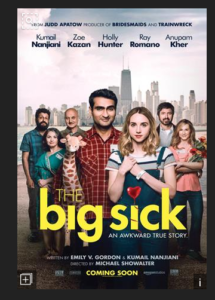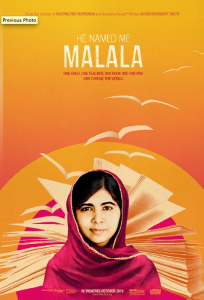July 7th, 2017 — 5:27am
 *****
*****
The Big Sick-rm
Kumail Nanjiani is a comic actor who is one of the stars of the TV series Silicon Valley. This movie is based on Nanjiani’s real life. It is co-produced by Judd Apatow who is known for two great comedy classics Bridesmaid and Trainwreck. Nanjiani comes from a traditional Pakistan family who emigrated from Pakistan to Los Angeles. They expected their son to marry a Pakistani girl which they would be glad to arrange for this to happen. They also would prefer that he become a lawyer rather than work in the world of comedy which he was doing as a struggling standup comedian. Emily (Zoe Kazan) meets Nanjiani when she makes some comments during his standup act at a comedy club. She is from Chicago but is living in Los Angeles. There is obviously a chemistry between these two as the story develops.
Stop here and read no further if you don’t like spoilers! Since there has been a great deal of press about this movie, you may know what develops in the film. One of us (SB) knew the story but still loved the movie. One of us (MB) also loved the movie but preferred not to know any spoiler events and viewed the film without knowledge of the background of the characters until he saw the movie.
So now, welcome to those who are just continuing with this review or perhaps are returning after you have seen the film. This movie was actually co-written by Kumail Nanjiani and his real life wife Emily V. Gordon. They recount how despite that they were very compatible sexually and otherwise, Kumail needed to please his parents and therefore broke off their budding romance.
The big event that changed everything was “The Big Sick†and that was a life threatening infection, which led Emily to be hospitalized and then put into a medical coma. This event brought her parents Beth (Holly Hunter) and Terry (Ray Romano) to Los Angeles where they meet and ultimately connected with Kumail. Hunter is terrific as the energetic and emotional mom. It is hard to forget Romano as anyone but “Raymond†of his classic TV series but he is still a likable character and could very well be the caring dad that he portrays. However, it is Nanjiani’s facial expressions that convey his emotional caring while his words express sincerity, irony, and comedy. These words, as well as the words added by all the actors were co-written by Nanjiani and his real life wife Emily V. Gordon. The comedic lines throughout this movie drew out loud laughter from our movie audience, which is something we often don’t see. Obviously, the continued existence of the co-writers of this film reveals a recovery and a happy ending of this movie and for this talented couple. The film is worth seeing whether you know the story or not. It is smart, funny, poignant and full of life, despite the “near death†experiences of the characters and their relationship! (2017)
Comment » | 5 Stars, Comedy, Romance
October 12th, 2015 — 12:59am
 ***
***
He Named Me Malala- rm
Malala Yousafzai is a Pakistani girl who grew up in the Swat Valley in Northwest Pakistan. As she was growing up, the local Taliban became increasingly powerful and instituted a policy of banning girls from attending school. Malala who is named after a famous poet and female warrior from Southern Afghanistan was approached by the BBC and asked to write a blog talking about how girls were prevented from having an education. She agreed to do so and began making speeches which were covered by the local and international press criticizing how the Taliban was taking away the rights of girls to get an education. Supported and encouraged by her father who was a teacher and a political activist himself, Malala continued to speak out. Soon, many of the schools in this area were destroyed by Taliban bombings. Malala’s activist speeches received worldwide recognition. Then. on October 2012 when Malala was 15 years old, a Taliban gunman approached her and identified her as who she was and point-blank shot her in the head. Miraculously, she recovered after extensive surgery and rehabilitation in England. Having the world spotlight on her in her campaign for girls’ rights to education, she continued her determination to speak out. In 2014, she was awarded the Nobel Peace Prize at the age of 17.
This movie is a documentary film directed by Davis Guggenheim, which shows a clear picture of this charming, most well spoken and dedicated young woman. Her personality shines through whether it is from actual video or film footage of her interacting with her parents and her precocious brothers at home, meeting President Obama or speaking before the United Nations. Through photographs and video clips as well as the use of animated cartoons, her pathway to this unique position on the world’s stage is depicted at the same time that we see her struggling with her school homework.
There is also some attempt to show the influence of her father upon her. Incidentally, he insists that he never pushed her to speak out and the decisions to do so were all her own. While that is the narrative of the film, it is clear that her father certainly was a powerful influence in her life. There is much less shown about her mother who does seem to be a vivacious and quite intelligent although uneducated woman.
The chronology in the film is not clear. The lack of focus on the time sequence of events may not be crucial as the story is probably well-known to the moviegoers who choose to see this film. Malala is amazingly articulate. She speaks English quite well and of course she is also fluent in her native language. She gives a heck of a speech with memorable lines that are obviously inspirational to young and old alike. We want to read her book ( I am Malala) and we are sure that we will want to give it to our granddaughters. This movie should have special appeal to those who know of her story and want to see the real person up-close. (2015)
Comment » | 3 Stars, Documentary
April 26th, 2013 — 6:00am
 ***
***
Midnight’s Children-sp This is a film adaptation of Salman Rushdie’s award winning 1981 novel which he himself slimmed down to a 130 page screenplay from his 600 page tome. Director Deepta Mehta then squeezed it into a 2 hour and 20 minute movie. The film follows children born on August 15, 1947 when colonial India was bifurcated into India and Pakistan. The main character is one of these children, Saleem, who is played as an adult by Satya Bhabba. Most of the other children are apparitions in his head which keep reappearing throughout the film. These children have all kinds of special powers and appear to be an allegory for the wishful thinking of the people who experienced terrible conflicts that have happened between India and Pakistan, East Pakistan and West Pakistan, Kashmir, and probably many other horrific wars that dominated the sub-continent during the past century. The story also uses the fascinating gambit of two children being switched at birth and challenges us with the idea of what would have happened if a child of privileged parents was raised by a poor family and vice versa. When you think of this part of the world you probably envision beautiful unsurpassed countryside, large mansions, women in flowing dresses as well as people living in close quarters in teaming slums. This film is filled with all these images and the cinematography was magnificent and creative. Most of it was handheld with credit going to Director of Photography Giles Nuttgens. Despite it’s unusual length, we found that we stayed engaged with the film. As much as we enjoyed the images, the action and the character interaction, we felt at a disadvantage as we struggled with trying to recall and place in historical context what we were seeing on the screen. This became heightened by the fact that we were periodically introduced to the “magical realism†going on in the head of the main character. We do imagine that the film will do very well in India and Pakistan. It was interesting to learn that there were concerns about threatened protests from the fundamentalist Hindus in India and the fundamentalist Moslems in Pakistan for the depiction of their people or from political supporters of the legacy of Indira Ghandi for the violent destruction of slum areas that were shown. All never materialized. What did appear is a unique epic film that may very well have captured the essence of this time and place.(2013)   Â
Comment » | 3 Stars, Drama, History
 *****
*****




 ***
***